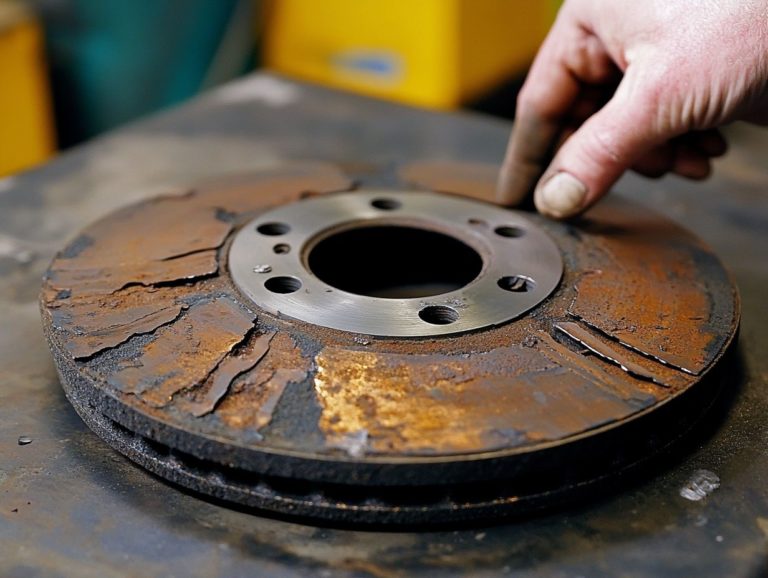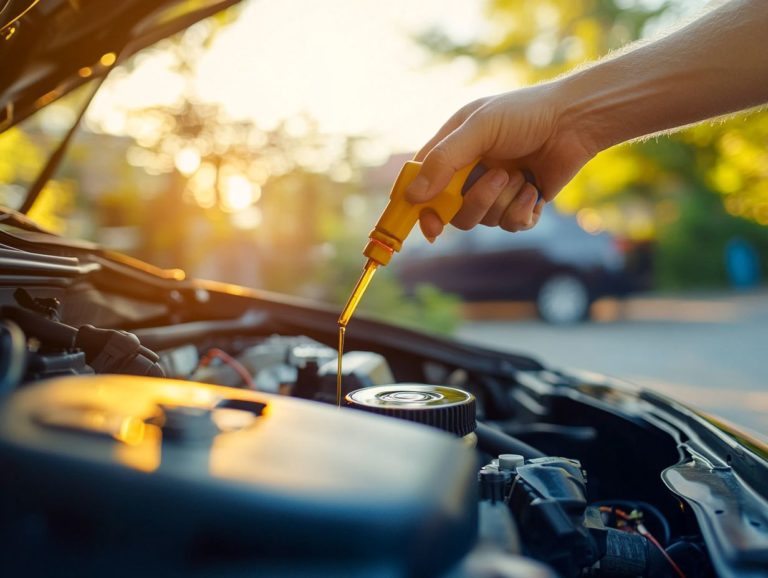What to Know About Engine Coolant Maintenance
Engine coolant is an essential element of your vehicle’s performance. It plays a pivotal role in regulating temperature and preventing overheating.
Understanding its significance and maintaining it properly can greatly extend your engine’s lifespan. This guide provides valuable insights into what engine coolant is, the advantages of regular maintenance, and the repercussions of neglecting it.
You ll discover how to identify common coolant issues, maintain it effectively, and choose the right type for your vehicle. Want your engine to last longer? Regular coolant maintenance is key! Immerse yourself in this knowledge to ensure your engine runs smoothly for years to come.
Contents
- Key Takeaways:
- Understanding Engine Coolant
- Importance of Regular Maintenance
- Signs of Engine Coolant Problems
- How to Maintain Engine Coolant
- Choosing the Right Coolant
- Tips for Extending the Life of Engine Coolant
- Frequently Asked Questions
- What to Know About Engine Coolant Maintenance?
- What is engine coolant and why is it important?
- How often should I check my engine coolant level?
- How do I check my engine coolant level?
- When should I replace my engine coolant?
- How can I tell if my engine coolant needs to be replaced?
- Can I mix different types of engine coolant?
Key Takeaways:
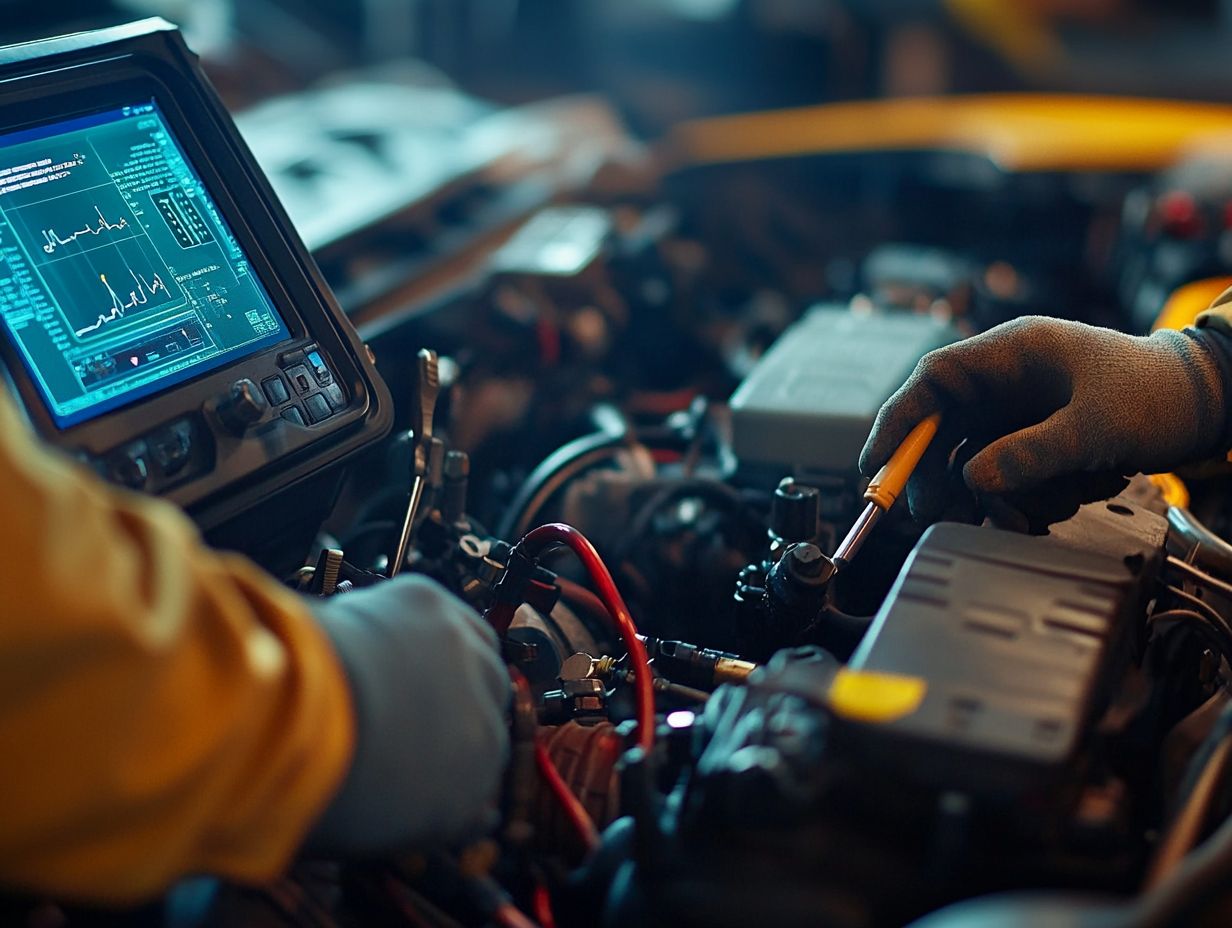
- Keep your vehicle s engine healthy with regular coolant maintenance.
- Neglecting coolant maintenance can lead to expensive repairs or engine failure.
- Selecting the right coolant and following maintenance steps will enhance your engine s life and ensure smooth driving.
Understanding Engine Coolant
Understanding engine coolant is essential for maintaining your vehicle. It regulates engine temperature, prevents overheating, and extends the life of automotive components.
Engine coolant, commonly known as antifreeze (a fluid that helps prevent freezing), comes in various types, including ethylene glycol and propylene glycol (fluids that help protect the engine), each designed to meet specific performance standards.
Advancements in organic acid technology have improved formulations that offer enhanced protection against corrosion (the gradual destruction of materials) and freezing.
It s crucial for every vehicle owner in Cache Valley to grasp the intricacies of engine coolant. This knowledge helps ensure optimal performance and avoid costly repairs.
What is Engine Coolant?
Engine coolant, commonly known as antifreeze, is an essential fluid that plays a pivotal role in regulating your vehicle’s engine temperature and preventing overheating.
This specialized formulation usually includes ethylene glycol or propylene glycol, which are essential for lowering the freezing point and elevating the boiling point of the liquid. As it circulates through the engine and radiator, coolant efficiently absorbs the excess heat generated during combustion, ensuring that your engine operates at an optimal temperature. The inclusion of various additives enhances its performance by inhibiting corrosion and preventing sludge buildup.
Opting for high-quality coolant not only elevates your vehicle s performance but also extends the lifespan of its engine components, significantly reducing the risk of costly repairs in the future.
Importance of Regular Maintenance
Regularly maintaining your engine coolant is crucial, though it s often overlooked. Ensuring that coolant levels are adequate and the fluid remains effective in preventing engine overheating and corrosion is vital.
Over time, coolant can degrade and lose its protective qualities. Mechanics highly recommend scheduled coolant replacement and inspection. By keeping an eye on your coolant levels and following manufacturer guidelines, you can enhance both the lifespan and performance of your cooling system.
Benefits of Maintaining Engine Coolant
Maintaining engine coolant offers several key advantages that elevate your vehicle’s performance, such as regulating engine temperature and preventing overheating.
By consistently monitoring and topping up coolant levels as needed, you can significantly enhance your engine s efficiency. Incorporating high-quality coolant additives into your system improves heat transfer and inhibits corrosion factors that extend the life of your engine.
This proactive approach not only ensures smoother operation but also helps you sidestep the financial strain of costly repairs that often stem from overheating issues. A well-maintained cooling system acts as a reliable safeguard, ensuring your vehicle operates optimally for years to come.
Don t wait until it s too late check your coolant today!
Consequences of Neglecting Maintenance
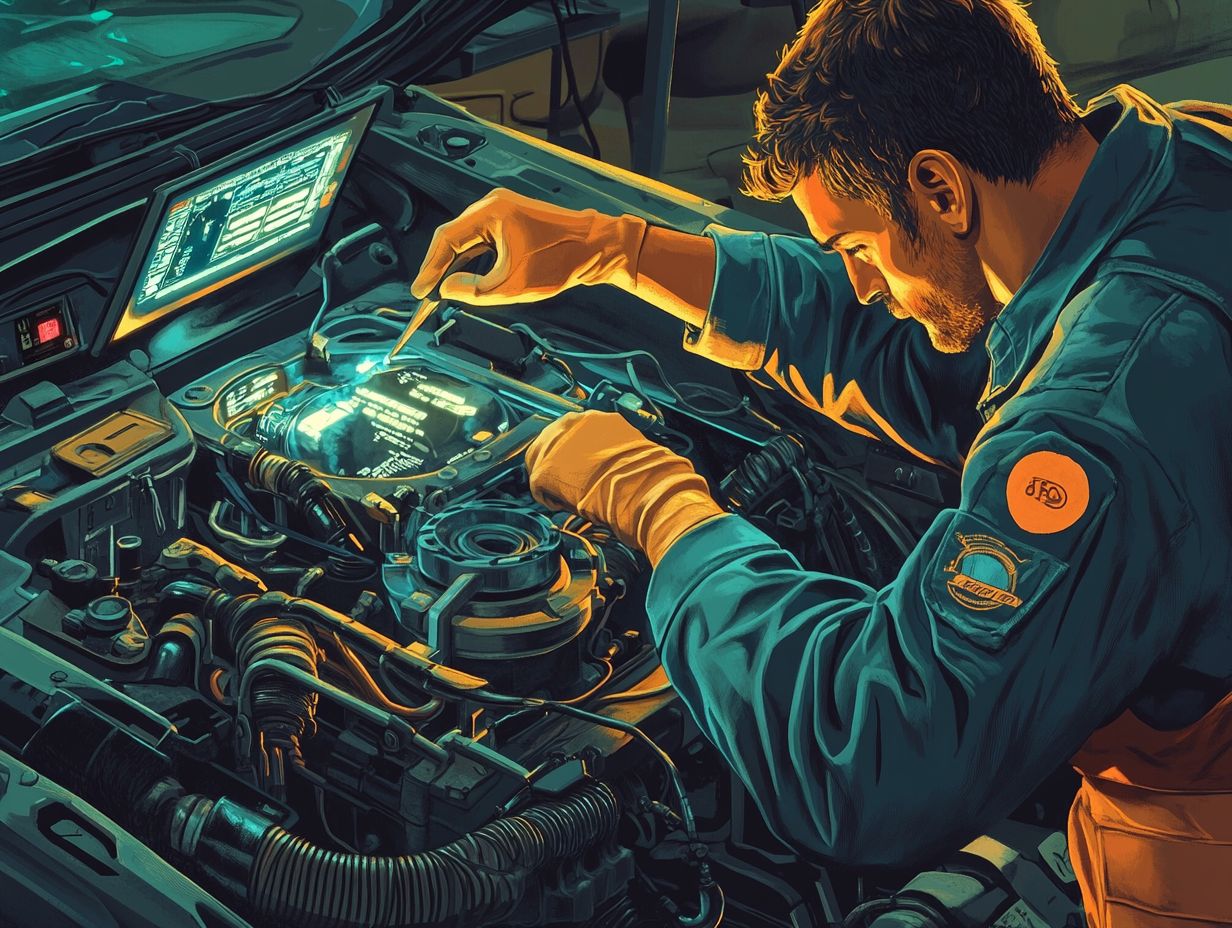
Neglecting regular maintenance of your engine coolant can lead to serious problems, including engine overheating that damages critical components. When coolant levels drop, corrosion can damage metal parts, leading to leaks and failures.
This not only affects your vehicle s performance but also accelerates wear and tear. It’s crucial to address minor issues before they become major problems. Keeping your coolant levels topped off is crucial to prevent costly engine damage!
The increased likelihood of unexpected breakdowns can inconvenience you and result in costly repairs that might have been easily avoided with proper vigilance. In essence, maintaining adequate coolant levels is vital for preserving the overall health and efficiency of your vehicle.
Signs of Engine Coolant Problems
Recognizing signs of engine coolant problems is crucial. Look for changes in coolant color, unusual engine temperatures, and coolant leaks to prevent severe damage.
Mechanics often emphasize the importance of being vigilant for these symptoms. Doing so ensures your vehicle stays in optimal condition and free from overheating issues.
Identifying Common Issues
Identifying common issues related to engine coolant is essential for maintaining a robust vehicle cooling system. Look out for leaks, contamination, and discoloration. Ignoring these issues can lead to overheating and costly repairs.
If you overlook leaks, your engine could overheat as the coolant level dwindles, risking damage to vital components. Contamination can occur when different types of coolant mix or when debris infiltrates the system, compromising the fluid’s effectiveness. Discoloration may signal rust or other harmful elements lurking within.
Regular checks of the coolant reservoir and hoses, along with periodic flushing of the system, can avert these issues. Using the correct type of coolant tailored to your vehicle is fundamental for ensuring optimal performance.
How to Maintain Engine Coolant
Maintaining engine coolant is crucial for its effectiveness and for the smooth operation of your cooling system. Regularly check coolant levels, conduct thorough inspections, and flush the coolant at recommended intervals to prevent overheating and corrosion.
Be aware of when to replace the coolant to enhance your vehicle’s longevity. This practice can safeguard it for the long haul.
Step-by-Step Guide for Proper Maintenance
To maintain your engine coolant properly, follow these essential steps: Check coolant levels often. Start by locating the reservoir near the radiator.
- Locate the coolant reservoir, typically near the radiator, and inspect the fluid against the marked indicators. If low, add the right type of coolant specified by your vehicle s manufacturer. This prevents overheating and corrosion.
- Consider performing a coolant flush. This replaces the old fluid and cleans the cooling system by flushing out any contaminants. When it s time to replace the coolant, use a funnel for a clean pour. After securing the cap, inspect the hoses and connections for leaks or contamination.
Regular inspections will significantly contribute to maintaining your engine s efficiency and longevity.
Choosing the Right Coolant
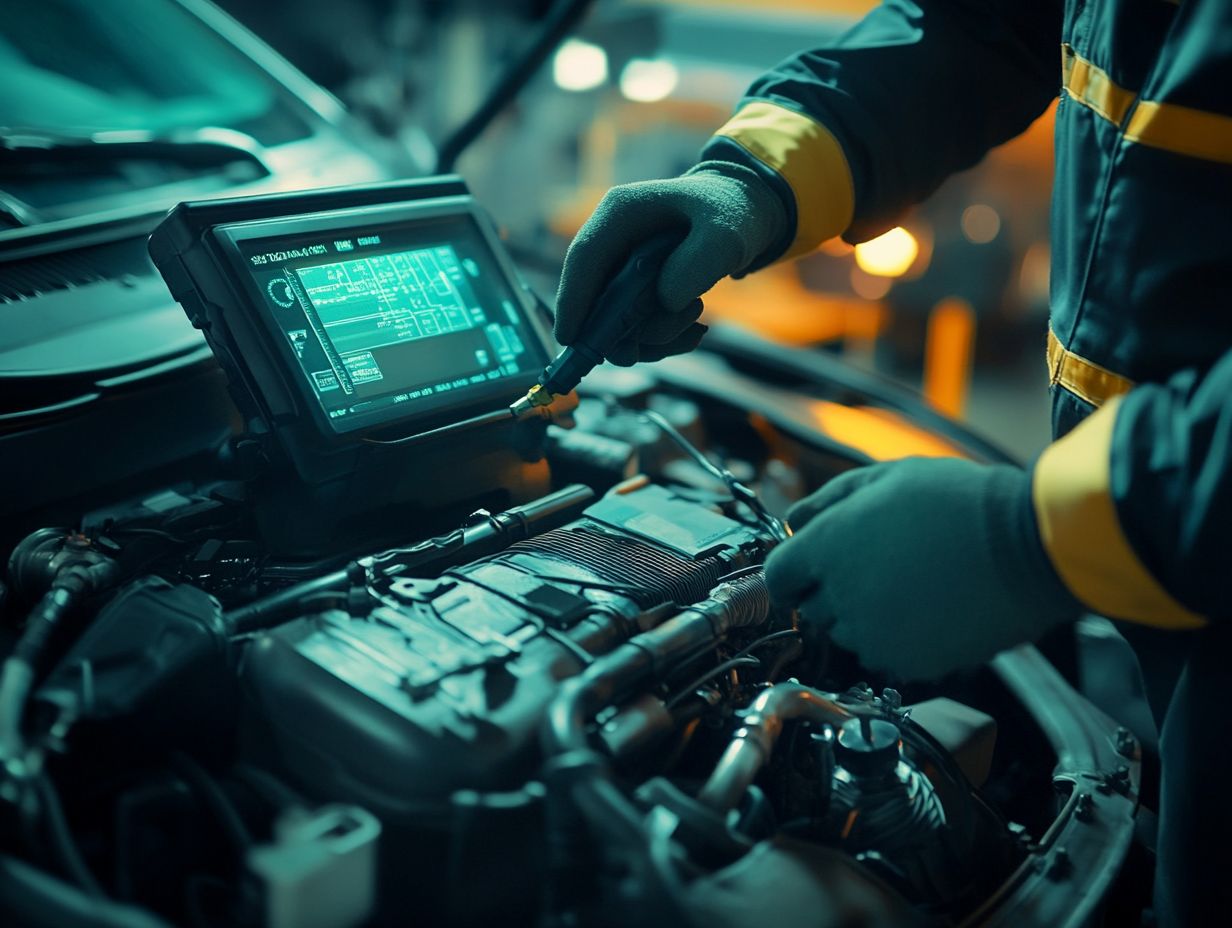
Selecting the right coolant is essential for keeping your vehicle’s engine running smoothly and protecting it against overheating and corrosion. Various coolant types, like ethylene glycol and propylene glycol, offer distinct advantages tailored to your automotive system.
Recent advancements in hybrid organic acid technology have produced coolants that not only boost performance but also extend the lifespan of your engine.
Take action now! Check your coolant levels and consult a mechanic if you notice any signs of trouble.
Factors to Consider When Selecting Coolant
When selecting coolant for your vehicle, it s crucial to consider a variety of factors, beginning with the types of coolant available namely ethylene glycol and propylene glycol.
The temperature range plays a pivotal role in this choice; extreme conditions can significantly affect engine performance. The specific type of vehicle you own may also dictate the ideal coolant formulation. This aligns with the manufacturer s recommendations to ensure optimal heat transfer and engine protection.
The selection of coolant also depends on its additives and anti-rust properties, which are designed to prevent rust and corrosion within the cooling system. By knowing these details, you can select a coolant that not only meets your vehicle’s performance requirements but also enhances its longevity.
Tips for Extending the Life of Engine Coolant
Extending the life of your engine coolant requires a few proactive strategies that guarantee optimal performance and safeguard against engine overheating.
Regular maintenance is key keeping an eye on coolant colors (which refer to the visual indicators of coolant quality) and incorporating suitable additives can greatly enhance its effectiveness over time.
By adopting these best practices, you can dramatically extend the life of your engine coolant, ultimately ensuring a smoother ride for your vehicle.
Best Practices for Prolonging Coolant’s Effectiveness
To extend the effectiveness of your coolant, it’s essential to embrace best practices, such as maintaining optimal coolant levels and performing regular maintenance.
Incorporating routine inspections into your schedule is crucial; this should involve checking for any leaks in the cooling system and assessing the condition of hoses and connections. You should also familiarize yourself with the recommended intervals for coolant replacement, as using outdated fluid can compromise its protective properties and potentially lead to engine damage over time.
Pay attention to signs of engine overheating, like a rising temperature gauge or unusual engine noises; these indicators can point to an underlying issue that demands immediate attention. By integrating these practices into your maintenance routine, you can significantly enhance the longevity and efficiency of your engine s cooling system.
Frequently Asked Questions
Got questions about engine coolant? Here are some answers to help you out!
What to Know About Engine Coolant Maintenance?
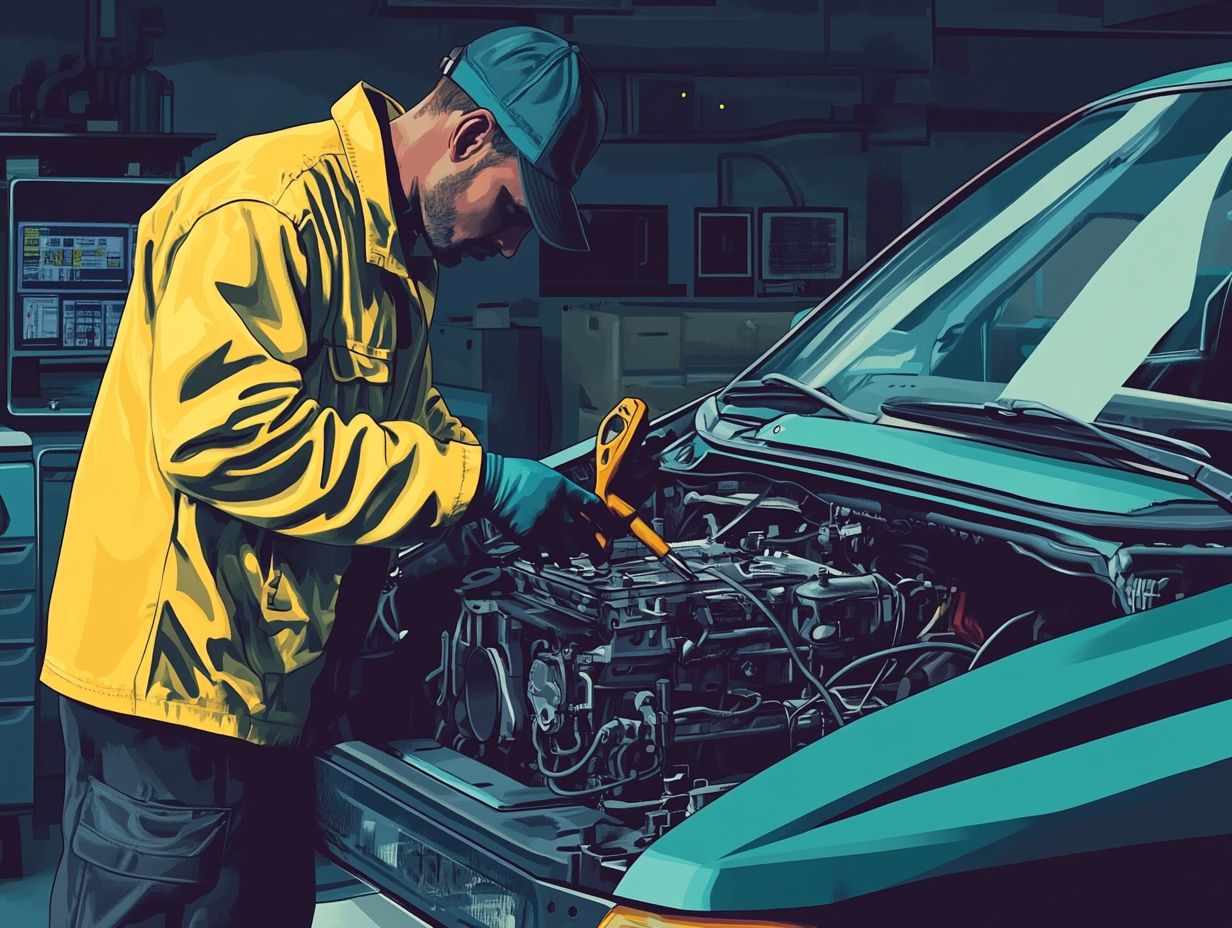
Engine coolant, or antifreeze, is a crucial component in keeping your vehicle’s engine running smoothly. Here are six important things you need to know about maintaining your engine coolant.
What is engine coolant and why is it important?
Engine coolant is a liquid that circulates through your vehicle’s engine to absorb heat and keep it from overheating. It is important because it helps regulate the engine’s temperature and prevents damage from overheating.
How often should I check my engine coolant level?
You should check your engine coolant level at least once a month, or before any long trips. It’s important to make sure the level is within the recommended range to ensure proper engine function.
How do I check my engine coolant level?
Start by locating the coolant reservoir under the hood. The reservoir is usually a plastic container with a cap labeled “engine coolant” or “antifreeze.” Check the level and add more if needed, but be careful not to overfill.
When should I replace my engine coolant?
It is recommended to replace your engine coolant every 2-3 years or every 30,000-50,000 miles, depending on your vehicle’s make and model. Over time, the coolant can break down and lose its effectiveness.
How can I tell if my engine coolant needs to be replaced?
If your coolant is cloudy or has debris floating in it, it’s time for a replacement. You can also use a coolant tester to check the pH level and determine if it needs to be changed.
Can I mix different types of engine coolant?
No, it is not recommended to mix different types of engine coolant. This can cause chemical reactions that can damage your engine. Stick to the type of coolant recommended by your vehicle’s manufacturer.

